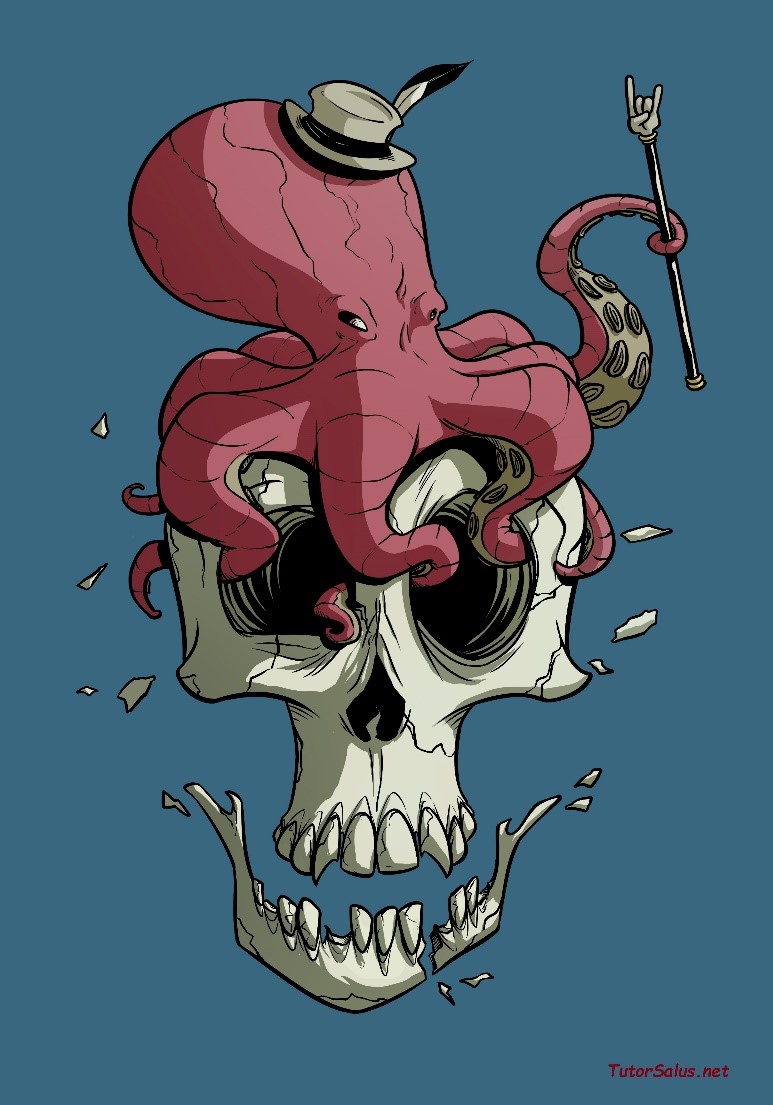Fixate on the lack…
Eros without body[1] ?

Original painting by Jacopo Ricci[2] and an excellent interpretation of Freud lesson in “Humour” (1927). Just for a moment – the time of a flash in thinking – conscience lets itself be represented as clung like an octopus on a skull that falls apart, then showing to the Subject how copable really is the anguish, as it doesn’t allow thinking. Humour is, by Freud, the willingness of a Subject to find an opening to a supposed ‘lack’, while when you fixate on a lack, you incur the disease, so weakening and disabling.
(Lou Andreas Salomè) : “…it is an exquisitely human fact that the man is - and at the same time is not - his own body, i.e. his body, despite it all, is a part like any other of the external reality. He can so externally be referred, with the help of his sensory organs, driving him back to an addiction which makes any other almost insignificant, like a children’s game, and lacking in tragedy. For that reason it is precisely the disease that makes us remember all that is innocent and touching in a man; but also, for the same reason, all this gives rise to feeling that someone is suffering because of all of us, and his own way of suffering becomes for us a symbol of what man is capable of.
(Sigmund Freud) : …Thinking over the interesting, but not always acceptable, observations you made on the relationship between man and his own bodily support, I wonder how you conceive the same relationship with such a surrogate which tries to be ‘I’ and yeti t may not be; an existing problem for our glasses, or dentures or wig, but not as intrusive as in the case of a bone prosthesis.”[3]
(Lou Andreas Salomè) : “…For example, in the erotic sphere, which touches a woman closely, I feared just about that my old age could enter too late (…) and that, as a consequence it could have deprived me of what most specific it has to give us, precisely as old age. …Because, together with the erotic experience, strictly speaking, we leave behind a dead end… where there’s only room for two people side by side, to enter an immeasurable expanse…”[4]
(Lou Andreas Salomè) : “…On the other hand, your essay on ‘Humour’[5] doesn’t convince me as much : I’ll briefly try to explain why. The reason is that the issue of relatives, whose backdated effects would condition the superiority of humour, basically is the same issue which trained us to take seriously all the data of reality which we, when children, preferred to bypass and which, due to all its rules and prohibitions, awfully deprived our connection to the reality of humour[6]…”
(Sigmund Freud) : …”Our mutual disagreement about humour, reminds me that I couldn’t solve one of your puzzles : why women much less nourish, and appreciate, humour than men.”[7]
Marina Bilotta Membretti / Cernusco sul Naviglio – November 14, 2020
[1] Quotes by “Eros e conoscenza. Lettere 1912-1936”, Ed. ‘Universale Bollati Boringhieri’ 2010.
[2] Jacopo Ricci, short biography. “Independent painter in Valenza-Alessandria (Italy), Jacopo Ricci is born in Milan in ‘80s (1988). He loves painting since he was a child but does turn on coloured pencils and brushes just at his Superior degree. He nowadays cooperates with online magazines, also for on demand commissions. In 2018 he illustrated ‘Dottor Tremarella’ and ‘Guarda Oltre’ (published by the author himself). In 2019 began also working on serigraphy.”
[3] “Eros e conoscenza. Lettere 1912-1936”, Ed. ‘Universale Bollati Boringhieri’ 2010 – p.135
[4] “Eros e conoscenza. Lettere 1912-1936”, Ed. ‘Universale Bollati Boringhieri’ 2010 – p.163
[5] ‘L’umorismo’, S. Freud (1927) in “OSF” Vol.10 pp.499-508 B.Boringhieri is a short essay following ‘Il motto di spirito e la sua relazione con l’inconscio’ (1905) : Freud proved the result of his observations on patients, also anticipating his more precious what his most fruitful legacy really is : the individual competence in the care of one’s thinking, and the strenuous resistance to it.
[6] The letter by Lou Andreas Salomè is dated November 6, 1927 : the essay ‘Humour’ was read by Anna Freud during the Congress at Innsbruck in the same year, in September; it was published on ‘Almanach des Internationalen Psychoanalytischen Verlags für das Jahre 1928’.
[7] “Eros e conoscenza. Lettere 1912-1936”, Ed. ‘Universale Bollati Boringhieri’ 2010 -pp.167-169